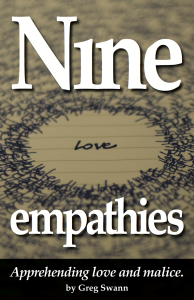
Do you see any room for a baby – an endlessly needy whining mammal that will never, ever pay back its monetary and opportunity costs – in there? That’s why you see so few babies among libertarians.Photo by: Lisa Rosario
I wrote about the de facto anti-family stance of broadly-defined libertarianism a while back, but I understand the issue much better now.
So: Why are libertarians so hostile to marriage and family?
For the same reason they’re libertarian in the first place: Because they’re Cautious, as a rule, in their empathy strategies.
“Say what?!”
In my book Nine empathies, I rehabilitate a personality-type assessment known as the DISC assessment, itself a quick-’n’-dirty way of figuring our what people want and how they will go about getting it. By re-examining the DISC motivations as a matter of empathy strategies, I was able to illuminate the ensuing relationship dynamics in my next book, Shyly’s delight. I’m going to explain all that jargon in a minute, but first please take note of this fact: I am the only source of new theory in a host of disciplines of interest to people seeking less government. If you’re reading anyone but me, you are wasting precious time to your own peril.

The Grand Unifying Theory of Human Motivation – as taught to me by a turtle, and by an eternally-outraged human reptile.To read more about empathy, see me, feel me, touch me, heal me at Amazon.com.
Mammals play and cuddle. What do reptiles do? They bask in perpetual fear. A reptile’s management of its own life consists of the obsessive micro-management of its environment. Reptiles pursue opportunities by avoiding risks, all as the result of genetic winnowing – fitness to breed – happening after birth rather than by mate selection.
If love is the default mental state of mammals, with the temporary interruption of playing and cuddling being the world’s only ills, what would you suppose is the default mental state of a reptile?
How about fear?
Reptiles fear, and they manage their environment by eliminating or mitigating any cause they might have to feel fear.
Why does that matter? Because libertarianism, until now, has deployed a fundamentally reptilian social strategy: My objective, as a libertarian, is not to engage with you in mutually-beneficial reciprocal transactions but simply to ‘live free or die’ all on my own, with no interference from you.
Reptilian empathy engages by aggression – “No Trespassing!” – where mammalian empathy deploys affection – “Welcome!” The values being pursued are different, too: Mammalian empathy seeks recurring, mutually-beneficial, reciprocal transactions, best typified by love-sweet-love and commerce-profitable-commerce. Reptilian empathy craves safety – from want, from uncertainty, from chaos. Given those two axes – types of displays and objectives sought – we end up with four possibilities, which correspond to the DISC personality types.

Find the love for life your dog never lives a day without at Amazon.com:Shyly’s delight: Work, play and love like a Labrador.
Drivens are driven, and if you didn’t know that, any Driven will be not-very-happy to remind you of that again – but he’ll be more-than-happy to pay you extra for expedited service. They are often bosses. Guess why. Incandescents want your attention, and they’re good at getting it. Their lights tend to shine brightest in sales and marketing positions. The Cautious like the safety that comes from predictable, orderly compliance with well-defined procedures and protocols. You’ll find them in droves in the accounting department, but the Cautious abound wherever the benefits of caution are revered. And the Sociables can’t fathom why we can’t just get along with each other. They care about everyone else’s relationships and feelings, very often, as we’ll see, to their own detriment.
And carrying that back to empathy strategies, as discussed in Nine empathies:
A high-S deploys mammalian empathy in pursuit of mammalian rewards – displays love in pursuit of love. A high-C deploys reptilian empathy in pursuit of reptilian rewards – displays aggression in pursuit of safety. A high-I deploys reptilian empathy in pursuit of mammalian rewards – displays aggression in pursuit of love. And a high-D deploys mammalian empathy in pursuit of reptilian rewards – displays love in pursuit of safety. The D loves by doing, the I by being loved, the S by loving and the C by relentlessly anticipating and having a contingency plan for every conceivable eventuality.
This matters why? Because libertarians are overwhelmingly Cautious personalities. They may idealize and aggrandize Driven people, but their actual value pursuits will be devoted to loss-avoidance rather than wealth-production. Sociables display affection in pursuit of affection. Drivens display affection in pursuit of production. Incandescents display aggression in pursuit of acclaim. And the Cautious display aggression in pursuit of safety.
And this tells us what about family formation among libertarians? Their social strategy is unilateral, as is their value pursuit, so reciprocal arrangements tend only to make sense to them when they are denominated in money. The idea of trading love for love is not one that comes naturally, where any other kind of trade makes no sense to a Sociable:
The reptilian drives are completely self-motivated, obviously, but also completely devoid of concern for any other entity’s feelings. Mammals care about mutually-beneficial empathy, because this amplifies the playing/cuddling feedback loop – the shared state of mutual enlovingness – all because the behavior is mutually-rewarding. The reptile’s purpose in engaging in this kind of empathetic modeling is strictly self-seeking: The reptile wants to know what you’ll do so he can counter it, oppose it, deflect it, defeat it – eliminate the threat.
Do you see any room for a baby – an endlessly needy whining mammal that will never, ever pay back its monetary and opportunity costs – in there? That’s why you see so few babies among libertarians.
The Cautious approach tends to make all social relationships among libertarians shallow and temporary. The preferability of unilateralism in both displays and objectives greatly inhibits the formation of storgic relationships – commitments rooted in the enduring love of families. The idea of ’til-death-do-us-part is alien to the Cautious mind, since the odds against that wager are so immense. Obviously, only people who do make that bet get to the pay-off – a family photo featuring two-dozen grinning people from four generations – but this is a victory reserved for much more Sociable folks.
From Rand to Rothbard, from Hayek to Nozick, Libertarian theorists are overwhelmingly Cautious, of course, and the Cautious approach to everything runs through virtually all libertarian thought – with my own work being the only exception I know of. Libertarians are routinely maligned as being cold, insectile nerds, but this not without cause: Their obsession with quantification and monetization puts them squarely among their greatest heroes, not Driven industrialists but Cautious academics.
This is curable. Amending this emotional deficit is one of the reasons I wrote Shyly’s delight. The cure for libertarians will consist of learning how to empathize more like a mammal and less like a reptile. But taking account that a key defect in the Cautious personality type is the unfounded faith in one’s own infallibility, this is not a hugely likely prospect.

Father’s DayMore Married. More Husband. More Father. More Man.Available at Amazon.com
As I noted when I wrote about this before, to the extent they are not resolutely pro-family, libertarians are de facto Marxists – where Marxism is the temporary and catastrophic mutiny of the Cautious over the Driven. The future belongs to the children of the parents who have them. So long as libertarians number themselves among the forces hostile to self-responsible family formation, they will be at war with their own freedom while they live, and their ideas will die soon thereafter.
Meanwhile, if you love children and the very rewarding investment that is a fully-committed family, have I got some wonderful ideas for you…















